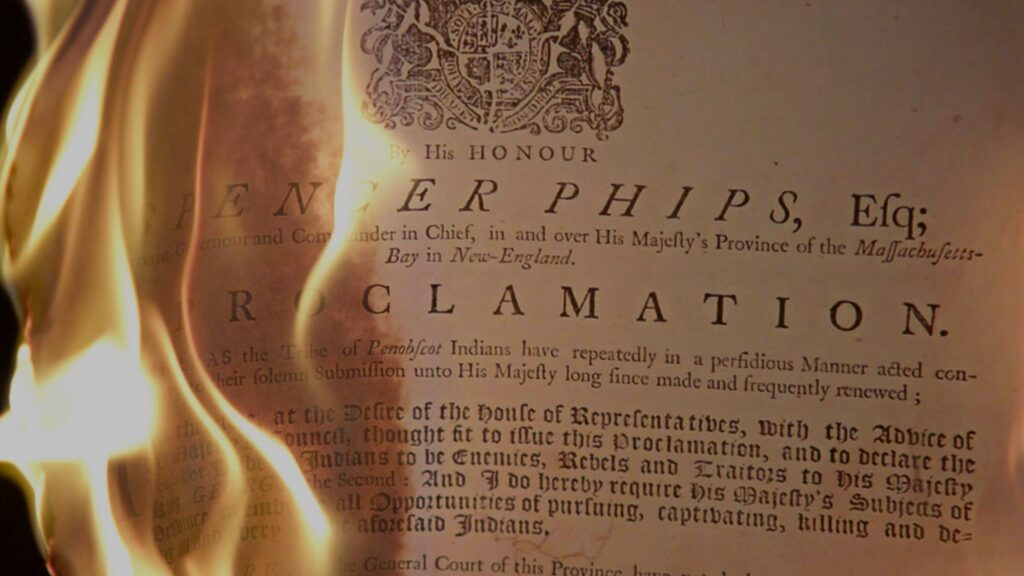New Film Installation at Boston’s Old State House Acknowledges Complex Indigenous Ties

Revolutionary Spaces to install looped short film in an effort to commemorate Indigenous survival and resistance to erasure: Bounty, a documentary about Native Peoples’ experiences under early America government-issued scalp-bounty proclamations
For Immediate Release
Contact: Sloane Wilten
BOSTON — Interpreting American history can be a complex task for historians, faced with hundreds of years of mythmaking that often obscures–sometimes deliberately–what really happened. This is a dilemma that the Boston nonprofit Revolutionary Spaces is facing head on as it installs Bounty, an independent documentary film from Boston nonprofit Upstander Project, at the Old State House. Bounty reveals the hidden story of the 1755 Phips Proclamation, one of many scalp-bounty proclamations that colonists issued with intent to exterminate Native Peoples in order to more easily take their lands throughout the area now known as New England. The documentary was filmed at the Old State House, the seat of government in colonial Massachusetts and the place where the proclamation was signed by Governor William Phips. Starting in July, visitors to the Old State House will be able to view the nine-minute documentary as part of the visitor experience.
In the film, Penobscot parents and children resist erasure and commemorate survival by reading and reacting to the government-issued Phips Proclamation’s call for colonial settlers to hunt, scalp, and murder Penobscot people in return for cash compensation. Issued on November 3, 1755 at the Old State House by Lieutenant Governor Spencer Phips, Commander in Chief of the Province of Massachusetts-Bay, it was one of at least 80 bounties that colonists used to target Native Peoples across the Dawnland (New England and Maritime Canada). Co-directed by Penobscot Nation citizens Dawn Neptune Adams and Maulian Dana, along with Adam Mazo, Ben Pender-Cudlip, and Tracy Rector of Upstander Project, Bounty was described by WBUR as a “potent new documentary.”
Penobscot Nation Ambassador Maulian Bryant, Bounty Co-Director and participant says, “I think it’s so important to see Penobscot people as modern day people with hopes and goals and things we are healing from, things we are working towards. I would love for people to feel like they are just learning the whole history of America.”
Adam Mazo, Bounty Co-Director and Upstander Project Creative Director added, “We made a choice for five of us to direct this film, a shift from traditional hierarchical norms in filmmaking. We believe it is also historic for resurfacing of hidden history and reclaiming of space by Penobscot people showing that they are here and thriving in the very room where genocide was authorized, in the heart of Boston, in a failed attempt to exterminate them.”
Historians at Revolutionary Spaces, which stewards the Old State House and the Old South Meeting House, believe it is critical to present a comprehensive narrative of the region’s history, which includes both the damage that colonists inflicted on Native Peoples in the eighteenth century and beyond through scalp bounties, as well as the resilience demonstrated by Native Peoples in the wake of these genocides. Screening the film at the same place where colonists not only signed the bounties, but also brought scalps in order to be paid by government officials, adds a powerful layer to the experience. While the undeniable shared history shown in Bounty is horrific, the documentary’s creation and inclusion at Old State House is designed so that people can become informed and inspired to take action.
“The events that happened at Boston’s Old State House during the eighteenth century were central to the founding of our nation,” says Nathaniel Sheidley, Ph.D., the President and CEO of Revolutionary Spaces. “Thousands of people visit our site each year in order to explore that history, and we have a responsibility to help our visitors understand that the nation’s founding is not only a story of the struggle for independence from Britain; it is also a story of conquest and the struggle of Native communities to preserve or recover their sovereignty in the face of European colonization and American expansion. Bounty transforms the Old State House into a platform for Native voices to tell this story in their own words and testify to both the profound legacies of genocide and, more importantly, the resilience of their communities. We hope the film will invite visitors to think deeply about these issues and spark dialogue about a better future.”
Bounty has screened at numerous film festivals, aired on public television, and along with its four-lesson Teacher’s Guide, the film has been featured in educational conferences and classrooms across the country. The film is nine minutes long, and available to view for free at the following link: https://upstanderproject.org/films/bounty
ABOUT UPSTANDER PROJECT
Upstander Project’s work is drawn from their vision for the future and their mission for today. Upstander Project produces Emmy® Award-winning documentary films, creates learning resources, facilitates educator workshops and impact campaigns. Built around films and learning resources, the nonprofit’s educational programming aims to create opportunities for deep engagement for K-12 classroom teachers, museum professionals, faith leaders, public sector workers and officials, and community educators. Upstander Project hopes to inspire and guide people to create more inclusive curricula, schools, public spaces and conversations, so that in turn, they influence others to become truth-tellers and upstanders.
ABOUT REVOLUTIONARY SPACES
Revolutionary Spaces stewards the historic Old South Meeting House and Old State House as landmarks, museums, and gathering spaces for the open exchange of ideas and the continuing practice of democracy. Viewing history as a powerful tool for today, Revolutionary Spaces brings people together to explore the American struggle to create and sustain a free society.
ABOUT THE OLD SOUTH MEETING HOUSE
The 1729 Old South Meeting House was a Congregational church and the largest gathering place for popular politics in Revolutionary Boston. Today it is a busy museum, treasured landmark, and active center for civic dialogue and free expression.
ABOUT THE OLD STATE HOUSE
The 1713 Old State House served as the seat of government for the province of Massachusetts during the Revolutionary era. Today, it is a museum and historic site offering tours, exhibits, and public programs exploring Boston’s Revolutionary-era history.

